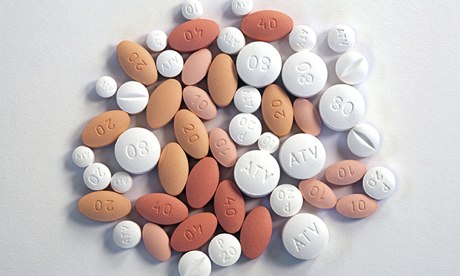
Should everyone over 50 be taking statins? asked an editorial in the Lancet last year. No, said an analysis article in last week's BMJ. Statins, in case you've escaped the hype, are drugs that block an enzyme in the liver that's needed to make cholesterol (we make it as well as eat it). Statins reduce levels of low density lipoproteins – the bad cholesterol that furs up arteries and can cause heart disease. But is there any benefit in taking a statin if you have a low risk of heart disease (you can currently buy them from your pharmacist if you are assessed as high risk)? And won't a healthy diet and exercise reduce cholesterol anyway?
The solution
There is a heated debate about statins in medicine. Some doctors feel that drug companies are pushing statins for increasing numbers of people. The benefit of statins for people who have already had a heart attack or stroke is well established – it reduces the risk of further events.
In healthy people Nice guidance recommends statins for people with a 20% or greater 10-year risk of developing heart disease. Doctors assess that risk using algorithms that include data on smoking, weight, diabetes, blood pressure, glucose and cholesterol levels. It's the use of statins for people with lower risk of heart disease that's controversial.
The Lancet editorial supported a meta analysis by the respected Cochrane group that added up results from 18 trials to find statins reduced deaths from all causes in people with low risk of heart disease.
The meta analysis said that of 1,000 people treated with statins over five years, 18 would avoid a major cardiovascular event. The review concluded there was benefit for those with less than 1% risk of a cardiovascular event over 10 years.
The BMJ article disagrees. It argues that the "events" in the trials included procedures to improve blood flow to the heart – who knows if the person would have had a heart attack if this hadn't been done? It also says that the side-effects of statins such as increased risk of developing diabetes (10%) and muscle pain (50% more common) were not adequately reported. It further points out that all the randomised trials in the Cochrane review were funded by the manufacturer of the statin being studied. Funnily enough another Cochrane review shows industry-sponsored studies are more likely to find positive results than non-commercial trials.
Since 80% of cardiovascular disease is caused by lack of exercise, poor diet and smoking, it would be better to address these factors rather than pop a statin.
Research, however, shows that people are bad at lifestyle changes. Then again, they're just as bad at taking tablets – half of those on statins are no longer taking them after a year.

